Orlando Concrete Services is Florida's best concrete company when it comes to all of our concrete services, including pool decks! Our team of professional concrete contractors has built, repaired, and resurfaced so many swimming pool decks, which have impressed all of our clients.
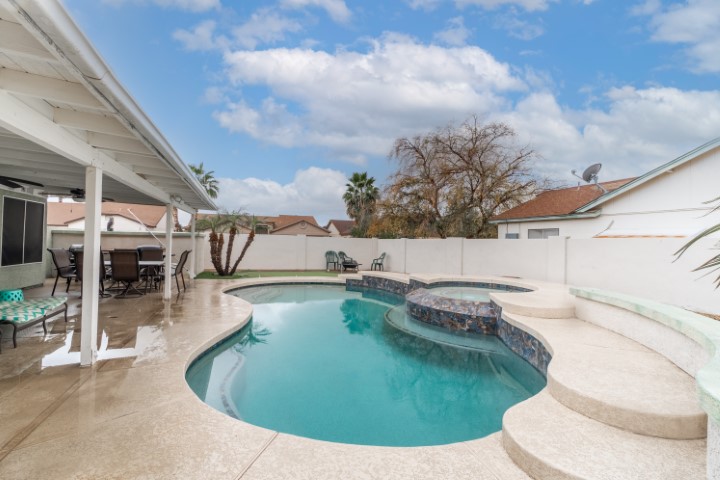

What Types of Damages Occur to a Concrete Pool Deck?
Cracks are the most common type of damage on any surface of concrete. There are likely to be cracks in areas around the corners of a pool deck and areas with heavier foot traffic. The next type of damage is discoloration and staining of the concrete. As pool water often contains many different chemicals to balance the pH level of the pool and to keep it clean. Water splashed on cured concrete can discolor a concrete deck or leave behind splash stains. Another type of damage is spalling and scaling, this is when the top layer becomes brittle and weak, which causes it to scale or spall off. This damage is caused by water and temperature change.
Why Repair a Pool Deck?
You may have a swimming pool deck that you are not satisfied with anymore, because the surface is or cracked, or the surface has faded or become slippery. Or, maybe it just needs to be remodeled. Orlando Concrete Services can repair or resurface any concrete pool deck and give it a new fresh look that you will be pleased with. Even if you want to remodel the pool deck, we can do that for you too! Through the use of decorative concrete, coatings, and overlays we can revive an old slab and make it look new again. Also, if the pool deck is still in good overall condition, repairs can save you a lot of time and money.
Installation of a New Pool Deck
So not only do we repair pool decks, but we can also install a brand new swimming pool deck for you. A concrete pool deck not only adds value to your home, but it also makes your pool look more inviting; it can transform the look of your entire pool and backyard. Pool decks can also be used as areas for entertainment. Our concrete contractors sit with you and show you the concrete deck designs as well as the concrete or stampings that can be used for the concrete deck of your pool. A concrete pool deck is also completed with a non-slippery finish that is so important near water, especially when you have children running around.
Cost of Pool Deck
While hiring our professional to perform the work is the most reliable way to get the job done, it is important to understand how much it costs. Hiring our company that does the work for a reasonable price is a good idea if you want your pool deck to look beautiful and last for many years to come. Resurfacing your pool deck can save you money and give you more control over the design.
Pool Deck Maintenance
Aside from the concrete surface, a pool deck needs to be properly sealed to keep it looking beautiful and safe. You can apply a film-forming sealer to concrete surfaces to keep water from penetrating the surface. Some films also contain slip-resistance additives. A textured or exposed aggregate finish adds aesthetic value to the pool. It is important to consider all of these factors when choosing the right pool deck maintenance in Orlando, FL.
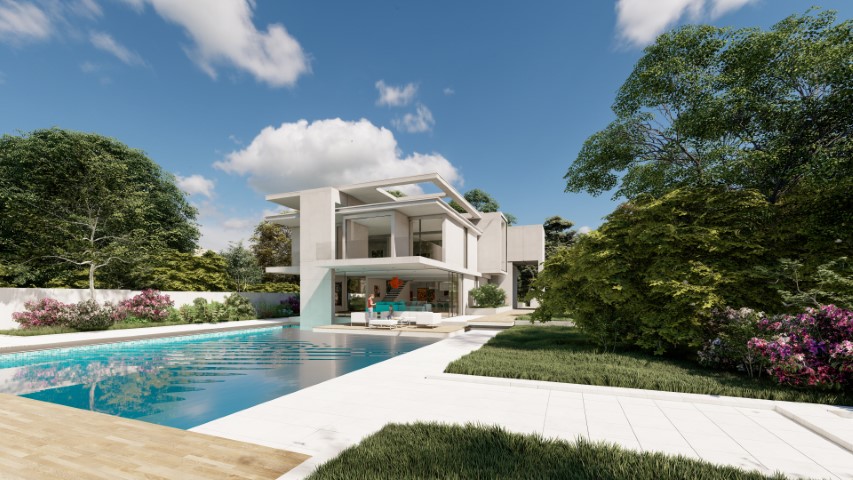
Pool Deck Pavers
When you want to build a pool deck in Orlando, FL, there are a number of things to consider before choosing a particular type of paver. Florida, for instance, requires that you install a safety fence around the pool. Many states also have rules about what type of material you can use. Fortunately, there are many choices for pavers made from natural stone products. While the choice is ultimately up to you, many of them are suitable for pool decks. When planning to build a pool deck in Orlando, FL, make sure you consider the climate. Orlando's climate is harsh on pavers, causing color pigment to fade and concrete elements to be exposed. Acid rain water will expose rocky elements inside the pavers, causing holes in the surface. The most prone places for paver holes are gutter downspouts, where the aggregate is more prominent. And of course, pool water can accelerate the degradation of pavers.
Advantages
Repairing a deck of your pool will save you time and money. Repairing means that when you need repairs, you don't have to rip the whole pool deck out. Also, repairs can be done to renew the look of your pool deck. The installation of a new concrete pool deck will last you a very long time. There is very low maintenance on a concrete pool deck as well. Concrete decks offer many style options to suit you, so you can choose decorative concrete to imitate other materials such as wood, stone, or brick. So for any new concrete pool deck installations or repairs, call Orlando Concrete Services today.
If you're interested in updating your pool deck, then look no further than our pool deck services in Orlando, FL. As the number one pool deck company in town, our experts handle everything from design and construction to painting and remodeling. You can choose from thousands of different pool deck surfaces, including stained concrete, acrylic lace, and exposed aggregate. Our team will make your dream pool deck a reality! And we'll do all of this while saving you money!
Nothing beats a backyard swimming pool for cool summer fun. While the water is the main attraction, the decking that surrounds it determines how well the pool fits into the landscape and how safe it is for swimmers. Pool decking should provide a safe walking path between pool ladders, diving boards, and slides, as well as a place to relax. If you're thinking about adding decking around your pool or renovating an existing deck, keep reading to find out what to look for!
Because bare feet are the norm on pool decking, it is critical that the material you select does not become slippery when wet or absorb excessive heat. Swimmers should be able to walk safely on wet surfaces without scorching their soles. The surface should ideally feel pleasant beneath the feet, so consider both comfort and safety when selecting pool decking material from the following options:
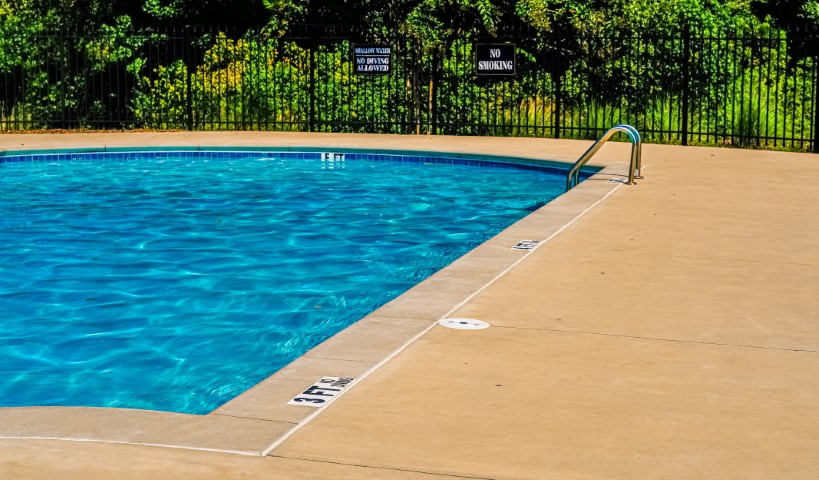
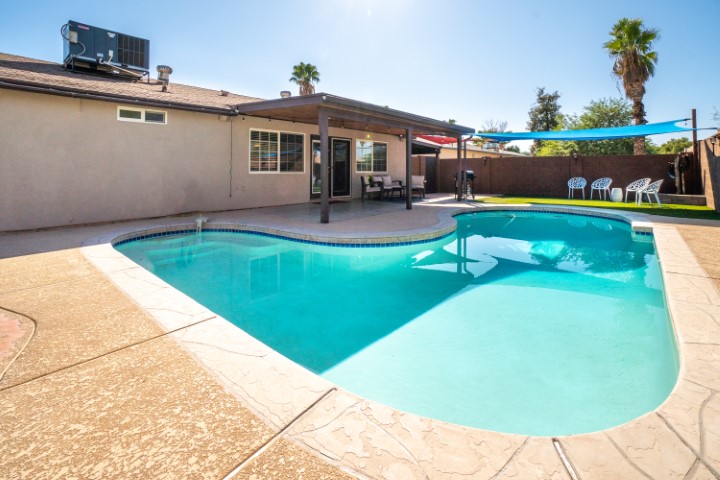
Poured concrete has been the material of choice for pool decking for decades due to its durability and resistance to water. Poured concrete, when finished with a brushed surface, allows swimmers to walk barefoot without fear of slipping.
Pros: Poured concrete can be formed and poured into virtually any shape you desire, including curves and geometric patterns. This long-lasting surface is also reasonably priced, costing $5 to $6 per square foot for professionally installed concrete or about $2 to $3 per square foot for materials only if you plan to do it yourself.
Cons: Concrete is only do-it-yourself friendly if the pour is small (six foot by six foot or less) and you have prior experience working with the material. Larger slabs should be left to the professionals because concrete can set in minutes on a hot, dry day. If you don't know how to smooth it quickly, you may have to break it out and start again.
Wood is a smooth material that feels great underfoot, but not all types are appropriate for pool decking. To repel water and insect damage, you'll need a good exterior wood, such as redwood, teak, cedar, or ipe (an exotic hardwood). Wood decking necessitates the construction of a floor joist system upon which the decking boards are installed. If you're familiar with basic pool deck construction principles and want to do it yourself, the materials to install wood pool decking will cost between $3.50 and $5 per square foot, depending on the wood species. Pro installation will cost an additional $5 to $10 per square foot.
Pros: Because it can be built right on top of an existing concrete or brick patio, wood decking is an excellent way to update it. It's also the preferred material for constructing stairs and decks around above-ground pools.
Cons: Because wood is a natural product, even the most weather-resistant varieties require an annual application of a sealant for protection. Wood decking may require refinishing every three to four years for long-term use, which includes sanding the surface and applying a sealant.
Brick is another do-it-yourself option that installs similarly to cement pavers—over a bed of sand to keep the material from shifting. Brick is slightly more expensive, with prices ranging from $.50 to $5 per brick depending on the type, and professional installation will cost an additional $2 to $5 per square foot. Brick gives the landscape a classic appearance, making it an excellent choice for historic homes.
Pros: Brick is long-lasting, and homeowners can choose from a wide range of colors and installation patterns. For decking, use paver bricks (those without holes).
Cons: Installation takes time because the bricks are small and must be set individually. Furthermore, dark bricks absorb heat and can be quite hot underfoot.
Pre-cast cement pavers, an excellent alternative to poured concrete, are available in a wide range of geometrical shapes, including squares, rectangles, and octagons.
Pros: Homeowners can select from a variety of gray and earthen tones, and installing cement pavers is a do-it-yourself project. The pavers are non-slip and reasonably priced, ranging from $2 to $4 per square foot. If you want professional installation, add $2 to $3 per square foot.
Cons: If cement pavers are not installed properly over an excavated bed of sand or gravel, they can sink and create an uneven decking surface.
Surface coatings contain epoxy, or a blend of polymer resins, sand, and cement, which allows them to adhere tightly to concrete surfaces and cover aging concrete pool decking. They provide a non-slip surface that is resistant to water and pool chemicals, as well as UV rays, so it does not become scorching in the summer sun. To update, seal, and add texture to the surface of the concrete, a variety of spray-on and roll-on products are available in both clear and opaque colors.
Pros: These coating products are excellent for treating existing pool decks that are too slippery or need a facelift. They're waterproof, low-maintenance, and DIY-friendly, with materials ranging from $1.50 to $2 per square foot; professional installation will cost an additional $2 to $4 per square foot.
Cons: Coating treatments only address the surface of the problem; they do not address deeper issues such as cracking or settling of the concrete.
Stone tile, an upscale material available in a variety of natural options such as travertine, limestone, and sandstone, adds a natural look to the landscape. In a pool setting, only unglazed stone tile should be used—glazed tile can be slippery when wet—and for comfort underfoot, choose light shades that won't absorb too much heat.
Pros: For sheer beauty, stone tile is hard to beat, providing a graceful surface for lounging and entertaining. It's also comfortable to walk on.
Cons: As a premium pool decking material, the materials alone will cost between $5 and $15 per square foot. Professional installation can cost an additional $3 to $18 per square foot, as some contractors may recommend pouring a concrete slab and then installing the stone tile on top.
Keep the following tips in mind whether you install the pool decking yourself or hire a pool deck professional at Orlando Concrete Services.
Call ahead of time. Even if you're only digging a few inches, call DigSafe (811), a free national service that will notify utility companies in your area so they can ensure their buried lines won't cause a problem.
Obtain the necessary building permit from your local building authority. Many municipalities prohibit the installation of solid surface, such as concrete, in an easement or over a utility line. It is better to check before you begin than to have to remove a section of the decking.
Think about the cost of curves. Professional installation for curved decking will be more expensive than for square and rectangular designs.
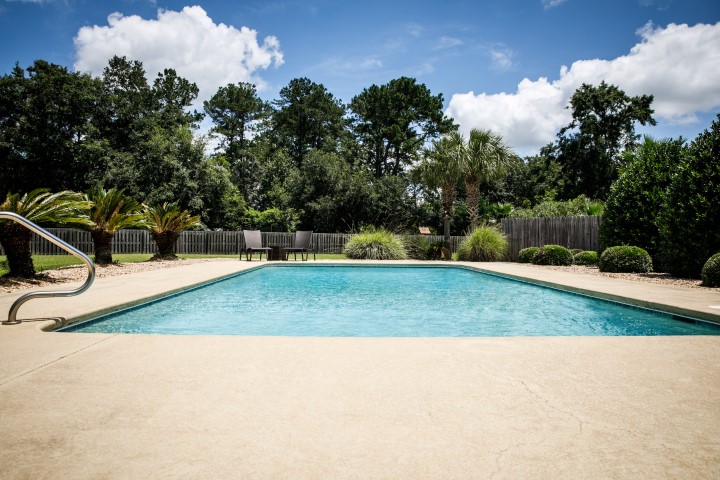
Consider the slope. Poured concrete, tile, brick, and paver pool decking require a slight slope to drain water. (Water drains away between the boards on wood decking, so the slope is unnecessary.) The slope should be one-quarter inch per lineal foot and should slope away from the pool to prevent dirty water, leaves, and debris from washing back into the pool.
If necessary, add a channel. Consider installing a channel drain somewhere between the two points to collect water and allow it to drain away to the side of the deck or a storm rain if you have extensive pool decking that runs from your home all the way to the poolside.
Don't overlook the foundation. A solid substrate is the foundation for great pool decking. Poured concrete, pavers, and bricks all necessitate excavation and a sand or gravel base. Tile can be installed over a similar substrate or over a concrete slab (check the tile manufacturer's specifications). A floor joist foundation is required for wood decking.
About Us
Orlando Concrete Services
Orlando, FL
(407) 554-5030
Let's Connect!
Whether you're interested in adding a new concrete patio, sidewalk, or driveway to your property, we have the expertise and experience necessary to get the job done right. So why settle for less? Hire us today and watch your property's exterior come to life!